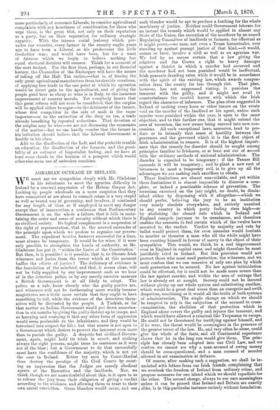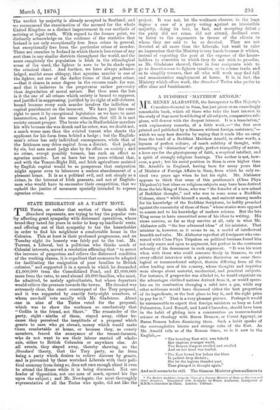AGRARIAN OUTRAGE IN IRELAND.
WE must say we sympathize deeply with Mr. Gladstone in his reluctance to meet the agrarian difficulty in Ireland by a renewed suspension of the Habeas Corpus Act. Locking up people wholesale on a mere suspicion that they have committed or are about to commit crime is a very stupid as well as brutal way of governing, and involves, if continued for any length of time or if employed to meet any danger except that of insurrection, a confession that Parliamentary Government is on the whole a failure, that it fails in main- taining the order and sense of security without which there is no civilized society. Its logical complement is a suspension of the right of representation, that is, the avowed surrender of the principle upon which we profess to organize our govern- ment. The expedient besides, however successful for a time, must always be temporary. It would be far wiser, if it were only possible, to strengthen the hands of authority, as Mr. Gladstone has put it, " within the limits of the Constitution." But then, is it possible ? is it possible, that is, to liberate Irish witnesses and juries from the terror which at this moment baffles the efforts of justice ? The deficiency of evidence is the foundation of the mischief, and that, it seems clear, will not be fully supplied by any improvement such as we hear of in the detective police, or by any merely coercive measure a British Government is at all likely to adopt. The police, as a rule, know already who the guilty parties are, and witnesses will not be forthcoming more readily because magistrates are a little more certain that they ought to have something to tell, while the evidence of the detectives them- selves will be distrusted by the people. A Turkish, or for that matter an Indian, Government would put down assassina- tion in six months by giving the guilty district up to troops, and so harrying and worrying it that any other form of oppression would seem preferable to the inhabitants, and they would be terrorized into respect for life ; but that course is not open to a Government which desires to protect the innocent even more than to punish the guilty. A despotic but civilized Govern- ment, again, might hold its trials in secret, and striking always the right persons, might issue its sentences as it were out of the blue ; but a Government to do that successfully must have the confidence of the majority, which is not yet the case in Ireland. Better try men by Court-Martial than destroy the prestige of the Civil Courts by creat- ing an impression that the Judges are merely obedient
agents of the Executive and the landlords. Nor, we think, though we are more doubtful about this, is it open to us to release the jury from their obligation of giving a verdict according to the evidence, and allowing them to trust to their own moral conviction. Gross blunders would occur, and one ' such blunder would be apt to produce a loathing for the whole machinery of justice. Neither could Government tolerate for an instant the remedy which would be applied in almost any State of the Union, the execution of the murderer by an armed Regulating Committee of landlords or farmers, for effectual as it might prove,—no man, not even a Texan horsestealer, ever standing up against prompt justice of that kind,—it would, sooner or later, involve a civil as well as an agrarian war. We feel by no means certain that a law giving the relatives and the Crown a right to heavy damages against a district in which a murder had occurred and the murderer had not been punished would be ineffectual, Irish peasants dreading rates, while it would be in accordance with the spirit of the existing law, which awards compen- sation from the county for loss through riot. That plan, however, has not suppressed rioting, it punishes the. innocent with the guilty, and it might not avail to counterbalance the morbid horror with which the Irish regard the character of informer. The plan often suggested in Ireland of making every lease or other tenure on the estate void on the murder of the landlord or his agent, unless such murder were punished within the year, is open to the same objection, and to this further one, that it might extend the area of terrorism, the new owner being coerced into new, con- cessions. All such exceptional laws, moreover, tend to pro- duce or to intensify that sense of hostility between the governors and the governed which it is the first object of Irish administration to remove. It is of the highest import- ance that the remedy for disorder should be sought among principles familiar to Irishmen, or at least not out of accord with the ordinary methods of national administration. The disorder is expected to be temporary ; if the Tenure Bill succeeds it will be temporary ; and to plant a new root of bitterness to meet a temporary evil, is to give up all the advantages we are making such sacrifices to obtain.
These limitations are almost unavoidable, and yet within these limitations it is almost impossible to discover a com- plete, or indeed a practicable scheme of prevention. The terrorism exercised on the jury might, no doubt, be dimin- ished either by dispensing with it altogether—which we should prefer, believing the jury to be an institution very nearly obsolete everywhere, and entirely unsuited to any country in which party feeling rises high—or by abolishing the absurd rule which in Ireland and England compels jurymen to be unanimous, and therefore enables the assassins to feel certain which of the twelve have assented to the verdict. Verdict by majority and vote by ballot would protect them, for even assassins would hesitate to murder or threaten a man who all the while might have been exerting himself in favour of mercy to the object of their sympathies. This would, we think, be a real improvement even in England in capital cases, and might therefore be most justifiably tried in Ireland. But this provision would not protect those who most need protection, the witnesses, and we must confess that we can conceive of only one plan by which such protection can be secured. No law against intimidation could be effectual, for it could not be made more severe than the law against murder, and within the area of outrage that law is already set at naught. Secrecy could not be insured without giving up our whole system and substituting another, which would be a great deal worse than an energetic and swift despotism, combining as it would all the faults of both systems of administration. The single change on which we should be tempted to rely is the subjection of the accused to cross- examination, the abolition of that protection which in England alone covers the guilty and injures the innocent, and which would have allowed a criminal like Tropmann to escape. He could not be threatened for testifying against himself, and if he were, the threat would be meaningless in the presence of the greater terror of the law. He, and very often he alone, could give the whole of the facts, and all Continental experience shows that he in the long run would give them. The prin- ciple has already been adopted into our Civil Law, and we confess we cannot see why a man accused of owing money should be cross-questioned, and a man accused of murder allowed to set examination at defiance.
Of course, after making such a suggestion, we shall be in- undated with letters from our Irish friends, complaining that we overlook the freedom of Ireland from ordinary crime, and propose measures for one island which we should repudiate for the other. The second charge, always to our ears meaningless unless it can be proved that Ireland and Britain are exactly alike, is in this particular instance entirely without foundation.
The verdict by majority is already accepted in Scotland, and we recommend the examination of the accused for the whole United Kingdom as a distinct improvement in our methods of arriving at legal truth, With regard to the former point, we distinctly acknowledge on the evidence of the statistics that Ireland is not only exceptionally free from crime in general, but exceptionally free from the particular crime of murder. There are counties in Ireland in which there is less crime of any sort than in any similar districts throughout the world, and the more completely the population is Irish in the ethnological -sense of the word, the lighter is sure to be its shade upon the criminal chart. And further, we have always acknow- ledged, amidst some obloquy, that agrarian murder is one of the lighter, not one of the darker forms of that great crime, —that it shares in some degree in the excuses made for war, and that it indicates in the perpetrator rather perversity than degradation of moral nature. But then none the less is it the one of all crimes which society is bound to suppress, and justified in suppressing, justified by its right of self-defence, bound because every such murder involves the infliction of .capital punishment on the innocent. We have just the same right to meet it by exceptional legislation as we have to meet insurrection, and just the same stimulus, that till it is met society cannot prosper. The brute who in Staffordshire murders his wife because she was drunk and he sober, was, we doubt not, .a, much worse man than the evicted tenant who shoots the applicant for his farm from behind a hedge ; but the English- man's crime has only individual consequences, while that of the Irishman may drive capital from a district. God judges -by sin, but man must judge also by its effect on society ; and no crime, except possibly treason, has such an effect as agrarian murder. Let us have but ten years without that, -and with the Tenant-Right Bill, and Irish agriculture assisted by English capital would be so prosperous that emigration might appear even to labourers a useless abandonment of a pleasant home. It is as a political evil, and not simply as a -crime, in the interest of Irish peasants, and not of English- mien who would have to encounter their competition, that we 'uphold the justice of measures specially intended to repress agrarian crime.



































 Previous page
Previous page